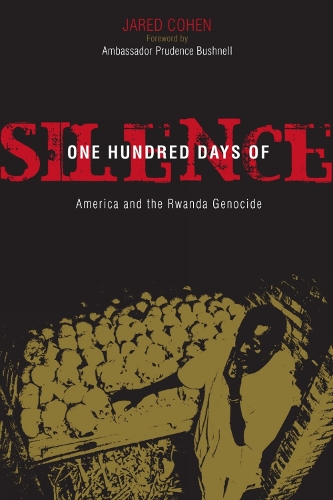
One Hundred Days of Silence: America and the Rwanda Genocide
(Paperback)
Publishing Details
One Hundred Days of Silence: America and the Rwanda Genocide
By (Author) Jared A. Cohen
Bloomsbury Publishing PLC
Rowman & Littlefield Publishers
28th December 2006
United States
Classifications
General
Non Fiction
Genocide and ethnic cleansing
967.5710431
Physical Properties
Paperback
268
Width 154mm, Height 229mm, Spine 18mm
431g
Description
One Hundred Days of Silence is an important investigation into the 1994 Rwandan genocide and American foreign policy. During one hundred days of spring, eight-hundred thousand Rwandan Tutsis and sympathetic Hutus were slaughtered in one of the most atrocious events of the twentieth century. Drawing on declassified documents and testimony of policy makers, Jared Cohen critically reconstructs the historical account of tacit policy that led to nonintervention. His analysis examines the questions of what the United States knew about the genocide and how the world's most powerful nation turned a blind eye. The study reveals the ease at which an administration can not only fail to intervene but also silence discussion of the crisis. The book argues that despite the extent of the genocide the American government was not motivated to act due to a lack of economic interest. With precision and passion, One Hundred Days of Silence frames the debate surrounding this controversial history.
Reviews
Jared Cohen interviewed those who usually have been overlooked by scholars and journalistsRwandans and mid-level U.S. Government officials. His bold freshness of approach was the starting point for this arresting analysisequally freshof exactly how the U.S. Government's ability to act morally in the Rwandan genocide crisis was immobilized. -- James Lowell Gibbs, Jr., Professor of Anthropology Emeritus, Stanford University
The U.S., along with the rest of the international community, failed to respond in any constructive way to stop the killing of roughly 800,000 people in Rwanda during the spring of 1994. This book represents a commendable effort to investigate the Clinton administration's response to evidence of genocide that seemed undeniable by the May. . . . Many interviews recorded here provide an account of what middle-level policy makers supposedly thought and said, and why minimal efforts to respond were thwarted by bureaucratic politics. Cohen, who now works for the U.S. State Department, explains why even the proposal that the U.S. jam incendiary radio stations was rejected, and a decision to provide military vehicles to a resuscitated UN force was delayed for an interminable period of time. Highly recommended. * Choice Reviews *
Cohen's book supplies greater detail than previous works about the beaurocratic decision-making that allowed the genocide in Rwanda to continue with impunity for ten long weeks. * Journal of Genocide Research *
After the Holocaust, many nations vowed "never again." But genocide occurred in Rwanda, and no nations moved to stop it. How could this occur In this thoughtful and carefully researched work, Jared Cohen provides chilling answers. Anyone interested in human rights and preventing genocide should read this book. -- Joseph S. Nye Jr., University Distinguished Service Professor, Harvard University
These essays are an excellent starting point on the subject, and trail blazes to encourage more research until Africa is no longer a place where terrorism can have a foothold. * Terrorism and Political Violence *
Author Bio
Jared Cohen, a Rhodes Scholar, received his BA from Stanford University and his Master's in International Relations from Oxford University. He is the author of Children of Jihad: A Young American's Travels Among the Youth of the Middle East.
